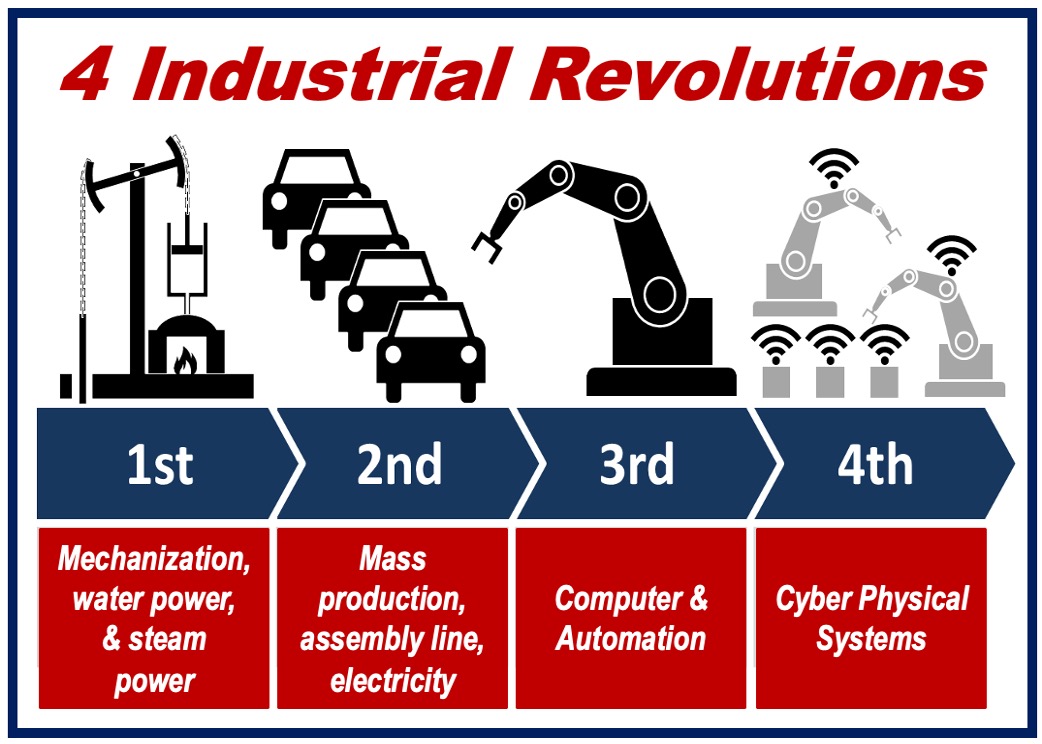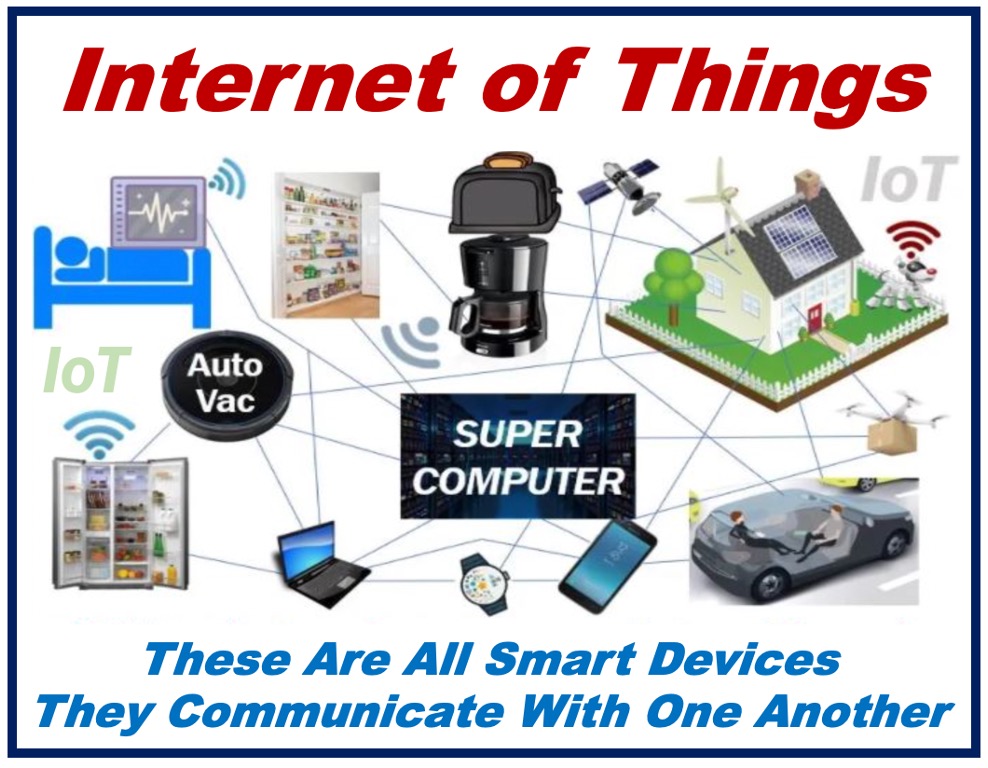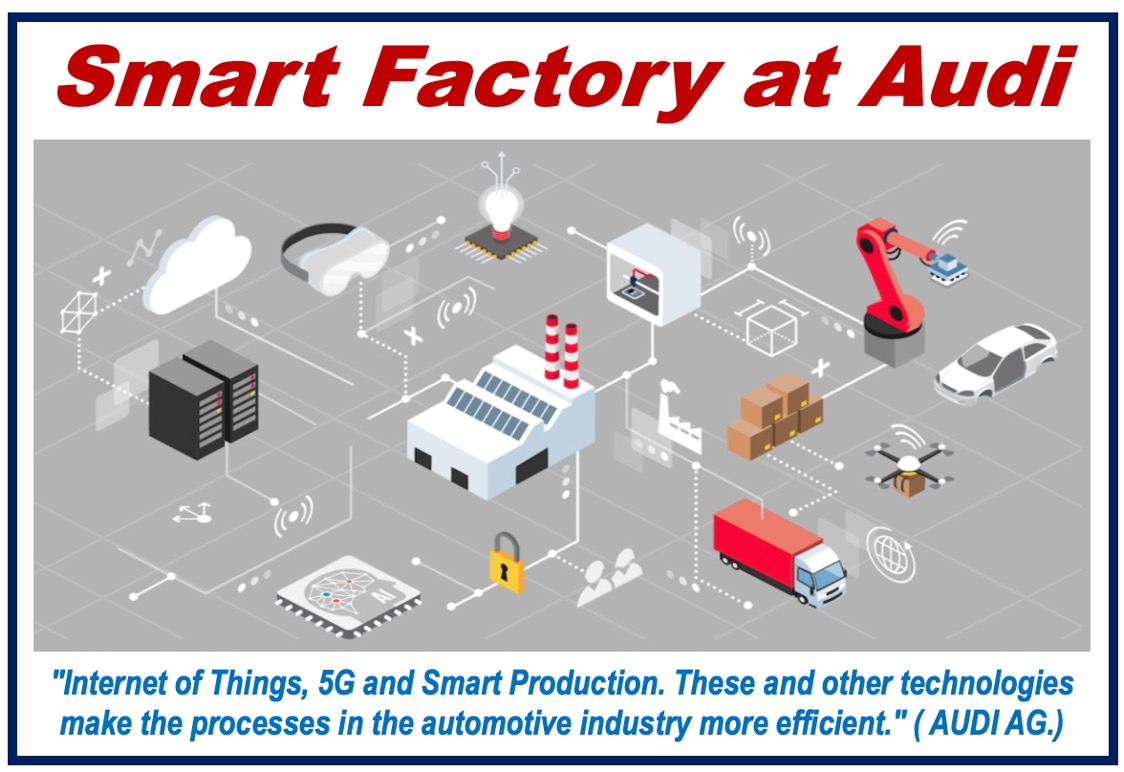Industry 4.0 is also known as the Fourth Industrial Revolution or 4IR. It refers to the rapid change in industries, technologies, societal processes, and patterns that have been taking place in the 21st century. The change is mainly due to increasing smart automation and connectivity.

The 1st, 2nd, and 3rd Industrial Revolutions
-
The First Industrial Revolution
The first industrial revolution, from 1760 to 1849, saw mechanization through steam and water power. If somebody says, “The Industrial Revolution,” this is the one most of us think they mean.
-
The Second Industrial Revolution
The second industrial revolution, from 1871 to 1914 saw the emergence of the motor car, and the extension of railroad networks and electrification.
-
The Third Industrial Revolution
The third industrial revolution, which occurred towards the end of the 20th century, was characterized by the spread of digitization and automation through the use of computers and other electronic devices, and the emergence of the Internet. Nuclear power became a major source of energy in many countries during this period.
Industry 4.0 – Manufacturing
IBM says the following about Industry 4.0:
“Industry 4.0 is revolutionizing the way companies manufacture, improve and distribute their products.”
“Manufacturers are integrating new technologies, including Internet of Things (IoT), cloud computing and analytics, and AI and machine learning into their production facilities and throughout their operations.”
Industry 4.0 is an extension of the 3rd industrial revolution, which was all about IT systems and electronics, especially in the manufacturing sector.
During the current revolution (Industry 4.0), most of those computers and electronic devices are communicating with one another.
Leveraging modern tech
A significant transformation is underway in how products are made and delivered. Manufacturers today aim for further automation and a flexible factory.
To survive in today’s fiercely competitive marketplace, they must leverage artificial intelligence, IoT, cloud computing, robotics, analytics, and other state-of-the art technologies.
The Internet of Things (IoT)

The Internet of Things or IoT has been a major enabler of Industry 4.0. IoT is a system of machines, computers, devices, objects, and people that are all connected with one another electronically – and in a growing number of cases, wirelessly.
Your refrigerator is connected to your computer, which is connected to dozens of devices within and outside your home. We call them smart devices (they can communicate with other machines).
Smart Factories

First, we had smart TV’s, refrigerators, and other smart office or home devices. Now, the smart factory has emerged.
Smart factories are equipped with embedded software, robotics that gather and analyze information, and sophisticated sensors.
With advancing technology comes better and faster decision making. In fact, a growing number of decisions which were made by humans are being made by smart machines today.
According to German auto maker Audi:
“The Internet of Things, 5G, and smart production. These and other technologies make the processes in the automotive industry more efficient”
Why the name ‘Revolution’?
These four revolutions are called revolutions because the innovation that pushed them forward did not just boost productivity – it totally revolutionized how people worked and made things.
Other Languages
Here is the term ‘Industry 4.0’ in various languages:
- Spanish: Industria 4.0
- Hindi: इंडस्ट्री 4.0
- French: Industrie 4.0
- Arabic: الصناعة 4.0
- Bengali: ইন্ডাস্ট্রি 4.0
- Russian: Индустрия 4.0
- Portuguese: Indústria 4.0
- Indonesian: Industri 4.0
- Urdu: انڈسٹری 4.0
- German: Industrie 4.0
- Japanese: インダストリー4.0
- Swahili: Viwanda 4.0
- Marathi: इंडस्ट्री 4.0
- Telugu: ఇండస్ట్రీ 4.0
- Turkish: Endüstri 4.0
- Korean: 산업 4.0
- Tamil: தொழில்துறை 4.0
- Vietnamese: Công nghiệp 4.0
- Italian: Industria 4.0
- Gujarati: ઇન્ડસ્ટ્રી 4.0
- Farsi: صنعت 4.0
- Bhojpuri: इंडस्ट्री 4.0
- Hakka: 工業 4.0
- Mandarin Chinese: 工业4.0
- Cantonese Chinese: 工業4.0
- Jin Chinese: 工業4.0
- Southern Min: 工業4.0
- Kannada: ಕೈಗಾರಿಕೆ 4.0
Industry 4.0, 3.0, 2.0, etc.
There are many terms that begin with the word “Industry” and then a number. Sometimes, the term is followed by a letter or a date. Let’s have a look at some of them:
- Industry 4.0: Refers to the fourth industrial revolution, which is characterized by a fusion of technologies that is blurring the lines between the physical, digital, and biological spheres.
- Industry 3.0: Denotes the third industrial revolution, which began in the ’70s and is based on the use of electronics and information technology to automate production.
- Industry 2.0: Represents the second industrial revolution, marked by the introduction of steel and use of electric power in factories, leading to mass production.
- Industry 1.0: Signifies the first industrial revolution when water and steam power were harnessed to mechanize production and begin industrialization.
- Industry 5.0: Although not yet fully defined, this term is starting to be used to describe the next phase in industrial evolution, focusing on the collaboration between humans and machines, personalization, and sustainability.
- Industry 9/11: Sometimes used to refer to industries impacted by the September 11, 2001, terrorist attacks, such as the aviation sector, or to the security industry that grew in response.
- Industry X.0: A term used to denote an ongoing transformation in the industry that encompasses not only production but also impacts all business operations across a variety of sectors, driven by digital innovation.
- Industry R&D: Refers to the research and development sector within industries, highlighting the importance of innovation and development in commercial enterprises.
- Industry B2B: Stands for “business to business,” which describes companies that primarily sell products or services to other businesses rather than to consumers.
Compound words with ‘Industry’
With the word ‘Industry,’ we can make dozens of compound words. Here are 15 of them:
-
Industry Standards
Accepted norms set by the consensus in an industry that are used as a benchmark for measuring excellence.
-
Industry Leader
A company that is the most advanced or successful in a particular industry.
-
Industry Analysis
A method for a company to assess its market and its competition.
-
Industry Trends
Patterns or tendencies that occur within industry sectors over time.
-
Industry Average
The average performance level or benchmark within a specific industry.
-
Industry Outlook
The projection or forecast of future events and trends in a particular industry.
-
Industry Growth
The rate at which a particular industry is increasing in size or value.
-
Industry Veteran
Someone who has a lot of experience within a specific industry.
-
Industry Jargon
Special words or expressions used within a particular industry.
-
Industry Regulation
Rules set by a government or industry body to control the activities within a particular industry.
-
Industry Expert
A person with extensive knowledge about a specific industry.
-
Industry Lobby
A group of people or an organization seeking to influence politicians or public officials on an industry-related issue.
-
Industry Innovation
The introduction of new ideas, products, or services within an industry.
-
Industry Collaboration
When companies or individuals work together for a common industry-related goal.
-
Industry Disruption
A significant change that challenges the traditional way of doing business within an industry.
Video – What is Industry 4.0?
This video, from our sister channel on YouTube – Marketing Business Network, explains what a ‘Industry 4.0’ is using simple and easy-to-understand language and examples.
